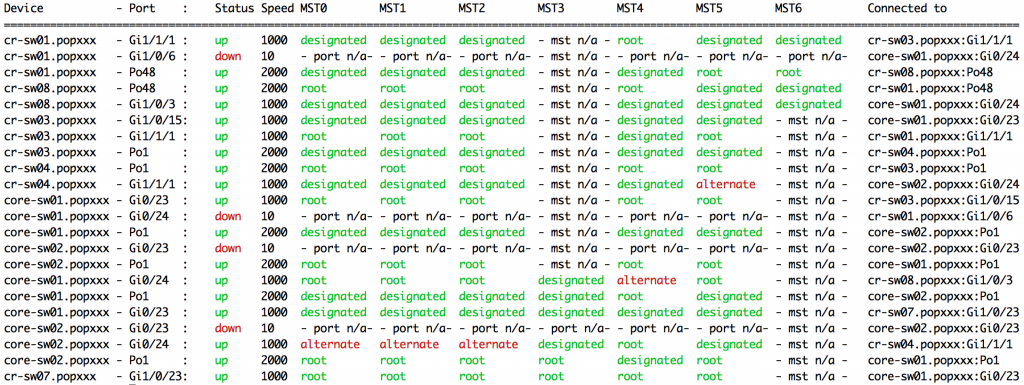Over at INEX we’ve embarked on a forklift upgrade of the primary peering LAN using Extreme Networks Summit x670’s and x460’s. As usual, we need to monitor these 24/7 and we have just written a new Extreme Networks chassis monitoring script which should work with most Extreme devices.
It will check and generate alerts on the following items:
- a warning if the device was recently rebooted;
- a warning / critical if any found temperature sensors are in a non-normal state;
- a warning / critical if any found fans are in a non-normal state;
- a warning / critical if any found PSUs are in a non-normal state (or missing);
- a warning / critical if the 5 sec CPU utilisation is above set thresholds;
- a warning / critical if the memory utilisation is above set thresholds.
You’ll find the script in this Github repository: barryo/nagios-plugins.
A some verbose output follows:
./check_chassis_extreme.php -c -h 10.11.12.13 -v CPU: 5sec - 4% Last reboot: 4007.7666666667 minutes ago Uptime: 2.8 days. PSU: 1 - presentOK (Serial: 1429W-xxxxx; Source: ac) PSU: 2 - presentOK (Serial: 1429W-xxxxx; Source: ac) Fan: 101 - OK (4388 RPM) Fan: 102 - OK (9273 RPM) Fan: 103 - OK (4428 RPM) Fan: 104 - OK (9273 RPM) Fan: 105 - OK (4551 RPM) Fan: 106 - OK (9452 RPM) Temp: 39'C Over temp alert: NO Memory used in slot 1: 29% OK - CPU: 5sec - 4%. Uptime: 2.8 days. PSUs: 1 - presentOK; 2 - presentOK;. Overall system power state: redundant power available. Fans: [101 - OK (4388 RPM)]; [102 - OK (9273 RPM)]; [103 - OK (4428 RPM)]; [104 - OK (9273 RPM)]; [105 - OK (4551 RPM)]; [106 - OK (9452 RPM)];. Temp: 39'C. Memory (slot:usage%): 1:29%.

![NOCtools Asterisk Wallboard [NOCtools Asterisk Wallboard]](https://github.com/opensolutions/NOCtools/wiki/images/asterisk-wallboard.png)